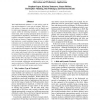5 search results - page 1 / 1 » A New Approach to Class Formation in Multi-Agent Simulations... |
ICMAS
1998
13 years 6 months ago
1998
Multi-agent models of language evolution usually involve agents giving names to internal independently constructed categories. We present an approach in which the creation of cate...
BMCBI
2010
13 years 5 months ago
2010
Background: A growing demand for tools to assist the building and analysis of biological networks exists in systems biology. We argue that the use of a formal approach is relevant...
COLING
2002
13 years 4 months ago
2002
The LinGO Redwoods initiative is a seed activity in the design and development of a new type of treebank. While several medium- to large-scale treebanks exist for English (and for...
JIB
2007
13 years 4 months ago
2007
The creation of quantitative, simulatable, Systems Biology Markup Language (SBML) models that accurately simulate the system under study is a time-intensive manual process that re...
LICS
2010
IEEE
13 years 3 months ago
2010
IEEE
ing the differential semantics of rule-based models: exact and automated model reduction (Invited Lecture) Vincent Danos∗§, J´erˆome Feret†, Walter Fontana‡, Russell Harme...

